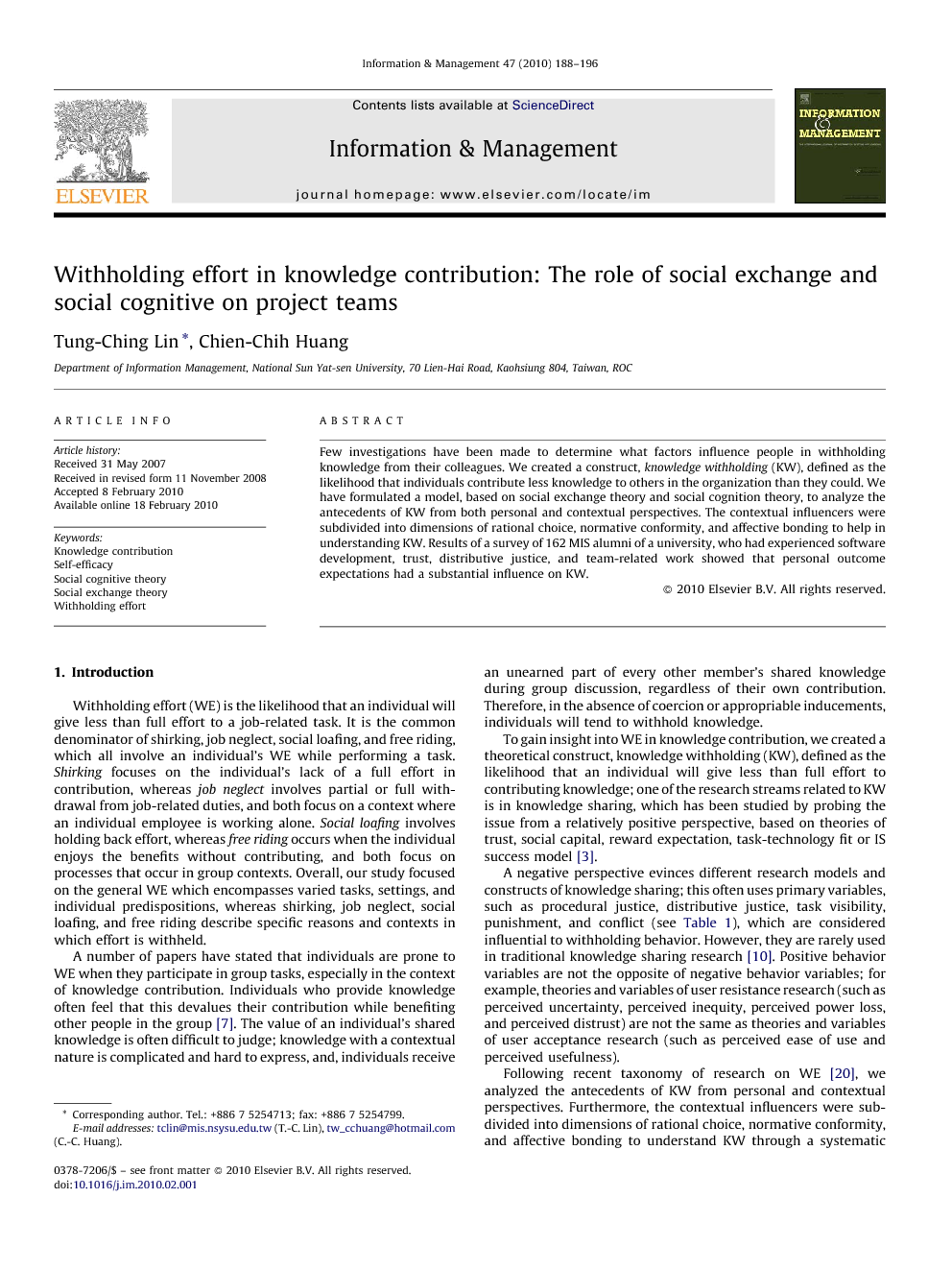Few investigations have been made to determine what factors influence people in withholding knowledge from their colleagues. We created a construct, knowledge withholding (KW), defined as the likelihood that individuals contribute less knowledge to others in the organization than they could. We have formulated a model, based on social exchange theory and social cognition theory, to analyze the antecedents of KW from both personal and contextual perspectives. The contextual influencers were subdivided into dimensions of rational choice, normative conformity, and affective bonding to help in understanding KW. Results of a survey of 162 MIS alumni of a university, who had experienced software development, trust, distributive justice, and team-related work showed that personal outcome expectations had a substantial influence on KW.
Withholding effort (WE) is the likelihood that an individual will give less than full effort to a job-related task. It is the common denominator of shirking, job neglect, social loafing, and free riding, which all involve an individual's WE while performing a task. Shirking focuses on the individual's lack of a full effort in contribution, whereas job neglect involves partial or full withdrawal from job-related duties, and both focus on a context where an individual employee is working alone. Social loafing involves holding back effort, whereas free riding occurs when the individual enjoys the benefits without contributing, and both focus on processes that occur in group contexts. Overall, our study focused on the general WE which encompasses varied tasks, settings, and individual predispositions, whereas shirking, job neglect, social loafing, and free riding describe specific reasons and contexts in which effort is withheld.
A number of papers have stated that individuals are prone to WE when they participate in group tasks, especially in the context of knowledge contribution. Individuals who provide knowledge often feel that this devalues their contribution while benefiting other people in the group [7]. The value of an individual's shared knowledge is often difficult to judge; knowledge with a contextual nature is complicated and hard to express, and, individuals receive an unearned part of every other member's shared knowledge during group discussion, regardless of their own contribution. Therefore, in the absence of coercion or appropriable inducements, individuals will tend to withhold knowledge.
To gain insight into WE in knowledge contribution, we created a theoretical construct, knowledge withholding (KW), defined as the likelihood that an individual will give less than full effort to contributing knowledge; one of the research streams related to KW is in knowledge sharing, which has been studied by probing the issue from a relatively positive perspective, based on theories of trust, social capital, reward expectation, task-technology fit or IS success model [3].
A negative perspective evinces different research models and constructs of knowledge sharing; this often uses primary variables, such as procedural justice, distributive justice, task visibility, punishment, and conflict (see Table 1), which are considered influential to withholding behavior. However, they are rarely used in traditional knowledge sharing research [10]. Positive behavior variables are not the opposite of negative behavior variables; for example, theories and variables of user resistance research (such as perceived uncertainty, perceived inequity, perceived power loss, and perceived distrust) are not the same as theories and variables of user acceptance research (such as perceived ease of use and perceived usefulness).
Following recent taxonomy of research on WE [20], we analyzed the antecedents of KW from personal and contextual perspectives. Furthermore, the contextual influencers were subdivided into dimensions of rational choice, normative conformity, and affective bonding to understand KW through a systematic analysis. Focusing on those WE factors that have centered on behaviors such as product selling [11], we attempted to identify how such relationships are built, extending their application to the field of KM, and determining which factors were the most important.
Following recent taxonomy of research on WE [20], we analyzed the antecedents of KW from personal and contextual perspectives. Furthermore, the contextual influencers were subdivided into dimensions of rational choice, normative conformity, and affective bonding to understand KW through a systematic analysis. Focusing on those WE factors that have centered on behaviors such as product selling [11], we attempted to identify how such relationships are built, extending their application to the field of KM, and determining which factors were the most important.


